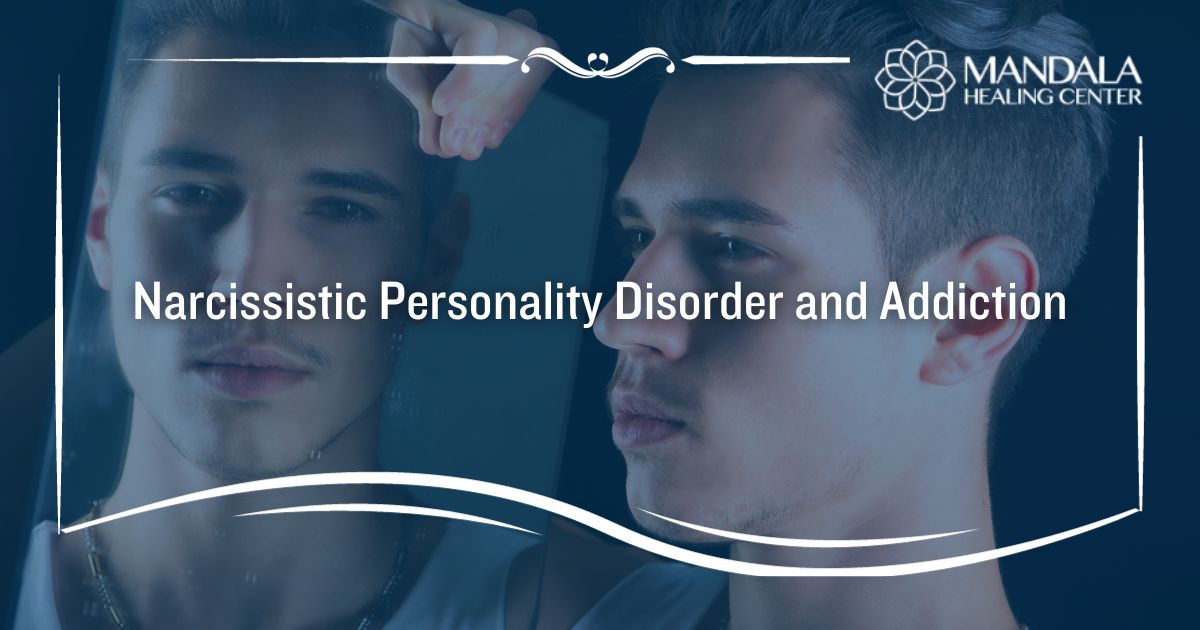Narcissistic personality disorder has been linked with a higher risk for substance abuse disorders. People with narcissistic personality disorder may face different barriers and challenges during treatment and recovery because of their complex mental health symptoms.
It is crucial to understand how narcissistic personality disorder can affect the diagnosis and treatment of a substance use disorder and to seek appropriate care when people have a co-occurring mental illness.
This article will explore the connection between narcissistic personality disorder and addiction. Contact the Mandala Healing Center specialists to learn more about dual diagnosis treatment or to find support at any stage of your recovery journey.
What is Narcissistic Personality Disorder?
Narcissistic personality disorder (NPD) is a mental illness characterized by chronic, often lifelong feelings of exaggerated self-importance, excessive need for reassurance in admiration, and an impaired ability to understand and empathize with other people’s feelings. Narcissistic personality disorder often impairs people’s ability to function and get along with others.
Personality disorders are generally characterized by destructive patterns of behavior, thinking, and understanding of a person’s own experience. These patterns of thinking and behaving go against societal norms and deviate from the social standards of any culture.
The characteristics of narcissistic personality disorder typically develop by the time a person is in early adulthood. Symptoms of narcissistic personality disorder can cause people a great deal of stress and prevent them from living and functioning normally.
There is no one accepted standard treatment for narcissistic personality disorder. However, medications and specific forms of therapy have been shown to be effective at helping people manage their symptoms.
Some of the most common signs of narcissistic personality disorder include:
- An inflated sense of self-importance
- The expectation that others will see them as superior
- Exaggeration of a person’s own skills
- An obsession with success, beauty, power, or intelligence
- A sense of entitlement to special or superior treatment over other people
- Taking advantage of other people for personal gain
- A lack of empathy
- A belief that others envy them
- Arrogance or an aloof attitude toward others
People with narcissistic personality disorder need recognition for their achievements– even if they did not complete them. They have a sense that they are better or more special than other people and tend to view others as a means to an end.
While not all people with narcissistic personality disorder will show these exact traits, people with this condition often exhibit some combination of these.
The Connection Between Narcissistic Personality Disorder and Addiction
Generally, people with mental illness– including personality disorders– are more likely to live with substance abuse and addiction. In some cases, people may use drugs or alcohol to self-medicate the symptoms of mental illness.
There are many links between people with narcissistic personality disorder and substance abuse. Here are some of the most critical aspects of this connection.
Narcissism and alcoholism
Narcissism and alcohol addiction share many traits and characteristics.
- Being driven by their drug of choice. For narcissists, attention is the drug of choice. An alcoholic’s motivation is alcohol. In both cases, people will do whatever they need to do at any cost for the drug of choice.
- Shame. People with alcoholism and narcissism are often driven by a need to avoid humiliation.
- Lack of insight. People with narcissism and alcoholism often refuse to look at the deeper meaning behind their behaviors. They may fear what they will see and be forced to accept their shortcomings.
- Blame. Alcoholics and people with narcissistic personality disorder will often avoid taking personal responsibility for their behaviors. They will instead blame external factors, including other people and situations beyond their control.
In both cases, similar characteristics can keep people with alcoholism and narcissistic personality disorder stuck where they are.
Challenges during treatment
People with narcissistic personality disorder who also live with substance abuse or addiction may face challenges during treatment. Narcissistic personality disorder can make people hostile, defensive, or even aggressive when confronted with their shortcomings. People with NPD may also refuse to believe that their choices and behaviors contribute in any way to the troubles they are experiencing.
These characteristics can prevent people with narcissistic personality disorder from getting treatment and complicate the treatment process for people who do. Recovery may take more time and involve many setbacks and challenges.
Recognizing a substance use disorder
The first step in getting help for substance use disorder is recognizing a problem. People with narcissistic personality disorder may not be reflective about their own behaviors and patterns. However, friends and loved ones may be able to identify a problem and encourage them to seek treatment.
Some common signs of a substance use disorder include:
- Using more drugs and alcohol than intended
- Needing to use more of a substance to get the desired effects
- Neglecting Hobbies, relationships, or responsibilities at work, home, or school
- Facing legal or financial trouble because of substance use
- Spending a lot of time or energy getting, using, or recovering from using drugs or alcohol
- Wanting to stop using drugs or alcohol but finding that it is impossible
- Experiencing withdrawal symptoms when not using drugs or alcohol
If you or someone in your life lives with narcissistic personality disorder and addiction, it can be challenging to begin treatment. Reach out to treatment centers near you for support or for help to stage an effective intervention
Find Help Now
Living with co-occurring mental illness and substance use disorders can be challenging, but you are not alone. Reach out to the Mandala Healing Center specialists now to learn about our holistic approach to dual diagnosis treatment or to find support at any stage of your recovery.












